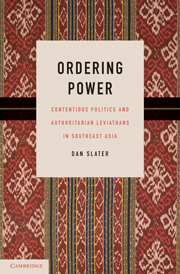Book contents
- Frontmatter
- Contents
- Map, Tables, and Figures
- Acknowledgments
- Map Contemporary Southeast Asia
- Part I The Puzzles and Arguments
- Part II Contentious Politics And The Institutions Of Order
- Part III The Foundations and Fates of Authoritarian Leviathans
- Part IV Extending the Arguments
- 8 Congruent Cases in Southeast Asia
- 9 The Consequences of Contention
- Bibliography
- Index
8 - Congruent Cases in Southeast Asia
Published online by Cambridge University Press: 05 June 2012
- Frontmatter
- Contents
- Map, Tables, and Figures
- Acknowledgments
- Map Contemporary Southeast Asia
- Part I The Puzzles and Arguments
- Part II Contentious Politics And The Institutions Of Order
- Part III The Foundations and Fates of Authoritarian Leviathans
- Part IV Extending the Arguments
- 8 Congruent Cases in Southeast Asia
- 9 The Consequences of Contention
- Bibliography
- Index
Summary
Parts II and III of this book explored how the ebbs and flows of contentious politics after the Second World War shaped authoritarian coalitions and institutions in Malaysia, the Philippines, and Indonesia. Whether authoritarian Leviathans would successfully resist pressures for democratization on the “back end” depended deeply on whether patterns of contentious politics facilitated elite collective action and the construction of powerful state and regime institutions on the “front end.” For all their undeniable quirks and particularities, each of these cases could fruitfully be conceived as an instantiation of a more general counterrevolutionary political trajectory: domination in Malaysia, fragmentation in the Philippines, and militarization in Indonesia.
This chapter widens the empirical scope, comparing four additional Southeast Asian cases with the three traced above. First, Singapore presents a case of domination that exhibits considerable congruence with Malaysia. Thailand and South Vietnam serve as cases of fragmentation in which party, state, and military institutions displayed incapacity and incoherence broadly congruent with the Philippine case. Finally, Burma provides an additional case – indeed, a paradigmatic case – of militarization, exhibiting noteworthy parallels with the political and institutional trajectory traveled by postcolonial Indonesia.
- Type
- Chapter
- Information
- Ordering PowerContentious Politics and Authoritarian Leviathans in Southeast Asia, pp. 229 - 274Publisher: Cambridge University PressPrint publication year: 2010



